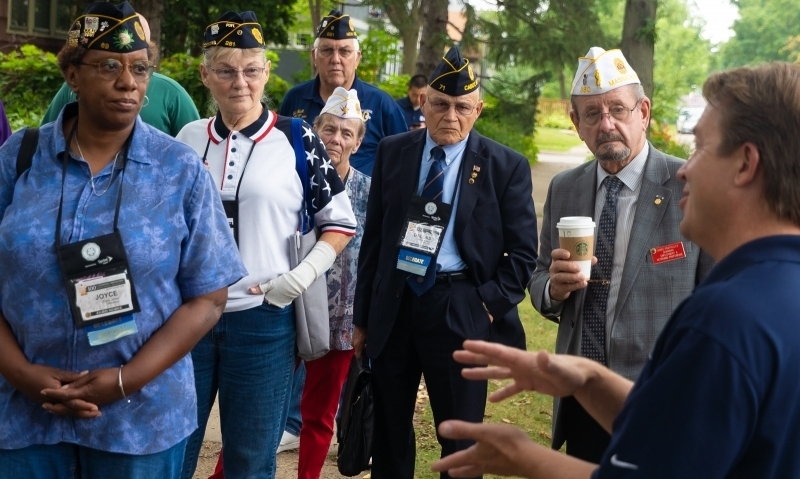
A success story seen in person
 View Photo Gallery
View Photo Gallery
Gerry Hince has been a member of The American Legion’s Veterans Employment and Education Division for four years. In that time, the Department of Texas chaplain and member of Earl Graham Post 159 in Bryan, Texas, has attended multiple meetings, getting reports and listening to presentations at all of them.
But on Aug. 27, Hince got to do something she considers very special: be a part of a visit with a local organization in Minneapolis working to end veterans homelessness.
During The American Legion National Convention, Hince and other members of the VEED Commission meet with members of the Minnesota Assistance Council for Veterans (MACV), touring three of the organization’s facilities.
“It’s phenomenal,” Hince said of the experience. “Today we got to see things that people have talked about. Now we’re going back and we’re saying ‘How do we do this in Texas?’ Seeing stuff like this, you can go back and say, ‘I saw success. I saw a success story.’ Where you’ve taken a program ... and it works well. And not just one year. It’s been continuous. That’s how this is supposed to work.”
Started in 1993, MACV operates 12 facilities in the Minneapolis area and also has offices in Mankato and Duluth, Minn. Their facilities range from Building 47 located on the Minneapolis Department of Veterans Medical Center campus, which houses 13 veterans and provides counseling and rehabilitation services, to homes located in Minneapolis neighborhoods that providing shared housing for veterans and smaller houses for veterans with dependents.
Residents typically have up to 24 months to stay in a facility or home. Veterans are charged 30 percent of their income for rent, maxing out at $330. If the veteran is unemployed, he or she can live rent-free in the facility.
“It gets them in the habit of paying rent,” said MACV Operations Manager David Nguyen, an Army Airborne veteran. “But it also puts them in the position of being able to save, which is part of all their housing plans. This allows them to save for their next place.”
Efforts like those of MACV’s have helped Minnesota reduce its veterans homelessness by 57 percent since 2010, which is well above the national average.
Jon Lovald, MACV’s senior operations manager and a U.S. Army Airborne veteran, said 70 percent of his organization’s budget is funded by state and federal grants, while the other 30 percent comes from private donations.
Lovald said relationships with organizations like The American Legion can help get the word out about MACV. “We don’t spend any money on advertising,” he said. “I look at (the VEED Commission visit) as outreach in the sense of people need to know MACV as a household name. It needs to roll right off the tongue when somebody says they’re struggling with their housing status. It should be MACV. But absent of an advertising plan or marketing plan, we really rely on everybody else spreading the word about MACV.
“If it’s the Legion … or another organization, they’ve got to know what we can do to help.”
Nguyen gave another example of how the Legion is helping MACV: by performing upkeep at one of the facilities. “We’ve also had The American Legion step forward and say, ‘Hey, we want to take care of this home that’s located near our post,’” he said. “How great is it that this (post), they get to go out there in the fall, do the work out there and help the vets. And the veterans get to see The American Legion coming in and helping hand. That’s another perfect fit.”
Greg DeWitt, who served in the Air Force from 1985-1990, came to Building 47 just a week ago. He already feels it’s going to help him get back on his feet.
“I love it, absolutely love it,” DeWitt said. “Between the counseling I’ve had, the groups I’ve gone to … I feel good. I’m really looking forward to going back to work. I want to get a job and an apartment living in downtown Minneapolis. It’s what my dream has been for probably the last 20 years or so.”
Hearing stories like that of DeWitt make Hince smile. “Seeing our veterans here and hearing them talk … it’s phenomenal,” she said. “Every (Legion) committee should be able to do something like this.
